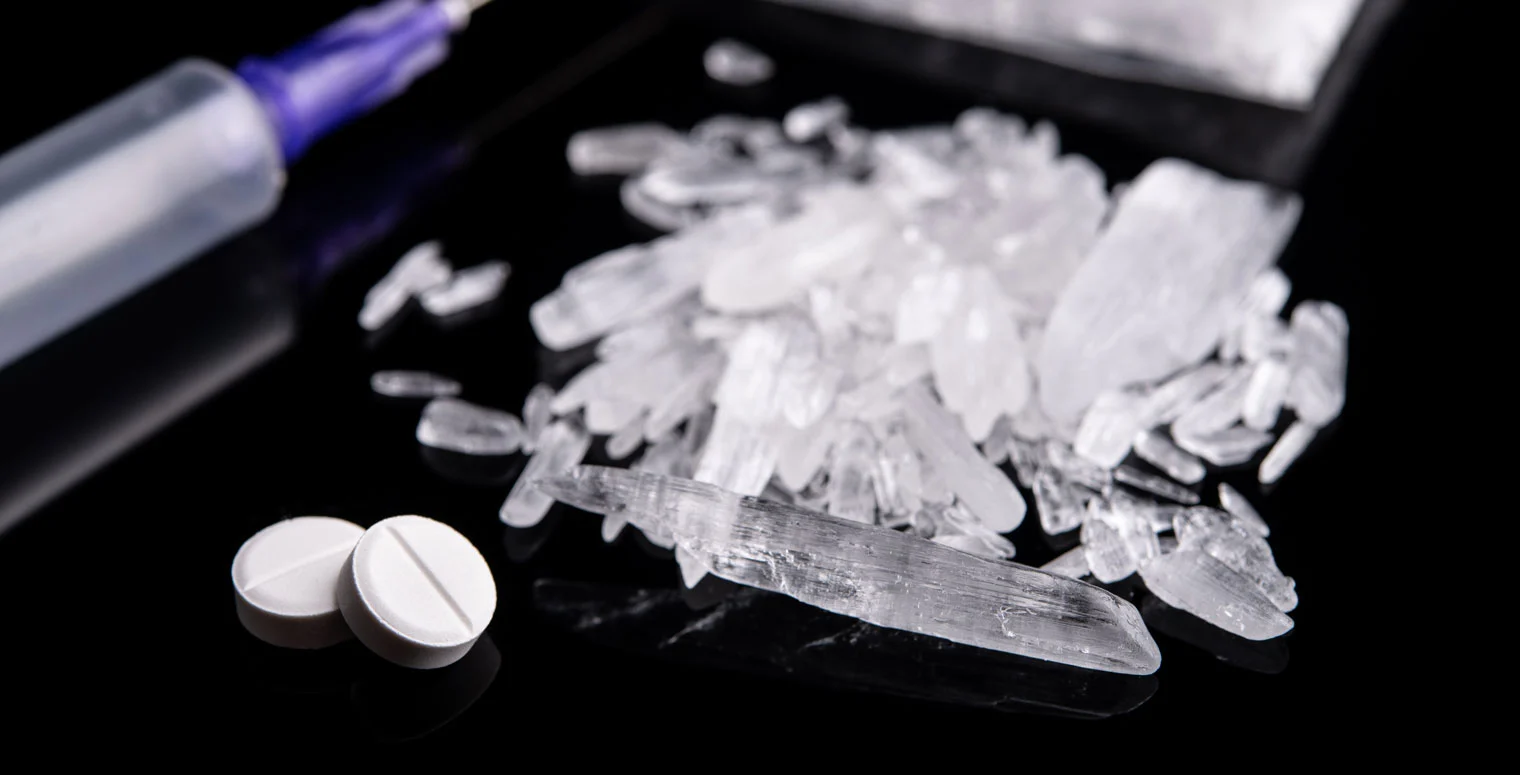What is Meth?
Methamphetamine, or meth, is a highly addictive stimulant drug. This substance works by directly affecting the nervous system, increasing the natural levels of dopamine – the chemical responsible for producing feelings of happiness and motivation – in the brain.
This interaction can produce a euphoric rush in those who take it, leading meth users to want to repeatedly abuse this substance in order to continue experiencing this high.
While methamphetamine can be used for medical purposes, it also has a high potential for drug abuse, making it a highly regulated substance.
Understanding Methamphetamine Addiction

With repeated meth use, an individual will begin to build a tolerance to this drug, needing to use it more frequently and in higher doses in order to achieve a desired high. This is because, over time, meth suppresses the brain’s ability to produce dopamine on its own.
This will eventually result in meth users developing a physical and psychological meth dependence, as they will need to continue using this drug in order to be able to experience pleasure or feel ‘normal.’
Unfortunately, meth abuse is a particularly common issue within the United States. According to a 2017 National Survey on Drug Use and Health, an estimated 1.6 million people recorded misusing meth that year; numbers that have only continued to increase since then.
Of course, with these rising cases of methamphetamine abuse, more substance abuse treatment methods and options have become increasingly available, as well. In the case of meth addiction treatment, detoxification is typically the first step in this process.
What is Meth Detox?
Quitting meth all at once can result in what is known as withdrawal, or the development of several unpleasant physical and psychological side effects of no longer using a substance that the body has become dependent upon.
Medical detox treatment can help treat symptoms of withdrawal for many types of drug and alcohol abuse, although it is particularly important for treating individuals with an opioid, benzodiazepine, or alcohol dependence.
When someone who is struggling with meth addiction participates in this treatment program, they will have this harmful substance gradually purged from their body, allowing them to slowly adjust to life without meth use.
As a crucial step of recovery from drug addiction, it is critical not to attempt to detox on one’s own, as methamphetamine withdrawal can be an extremely uncomfortable, and even dangerous process to undergo without professional support.
How Long is the Meth Detox Process?
On average, meth detox can take anywhere between 2-7 days to complete, depending on a number of factors. These may include:
- The severity of an individual’s methamphetamine dependence.
- The presence of any underlying mental or physical health conditions.
- The method and type of meth used.
- Other simultaneous drug and alcohol abuse.
While this detox period may be shorter compared to other forms of substance abuse, it is still highly recommended to undergo this process with medical supervision. After all, many of meth’s withdrawal symptoms can feel near unbearable to go through alone.
Meth Withdrawal Symptoms
When it comes to meth withdrawal symptoms, these can differ from one person to another. In general, however, this substance use disorder can be characterized by a number of physical and psychological withdrawal symptoms that will require proper treatment to overcome.
Physical Symptoms Of Meth Withdrawal
EXTREME FATIGUE
One of the effects of meth usage is hyperactivity; it is one of the reasons users get hooked. Once they stop using, however, this effect is reversed. As such, their energy levels plummet, constituting the beginning part of the crash phase.
Individuals will typically feel drained, and, once this fatigue peaks, may experience a condition referred to as hypersomnia, in which they sleep through an entire day. This period is also characterized by vivid dreams, although these should subside within a few days.
SPIKE IN APPETITE
One of the common side effects of meth usage is a lack of appetite. Once a person begins to detox from meth, however, their appetite will begin to build. This can cause intense cravings for starchy and sugary foods. These will subside over time, and should be gone by the third week.
MUSCLE SPASMS
Muscle spasms can be quite painful and can be likened to the pain experienced during a stitch. It often manifests itself in the form of an involuntary twitch under the skin that may feel firm to the touch. This is because the muscles are contracting, often taking some time for them to relax.
HEADACHES AND DEHYDRATION

During the withdrawal phase, it is common to experience intense headaches or migraines. As the body adjusts to the lack of the drug, it results in severe discomfort in more ways than one. It could be a result of excessive sweating or constipation.
Additionally, dehydration is one of the recorded side effects. Some individuals also experience dry tongue and other associated withdrawal symptoms. If not properly managed, improper hydration can lead to far more dangerous side effects.
STRONG METH CRAVINGS
This is a much-expected symptom of meth withdrawal. At some point, there is an intense urge to ingest more meth and experience the accompanying euphoria. Altogether, this is a symptom that is often part and parcel of withdrawal from all addictive substances.
PSYCHOLOGICAL SYMPTOMS OF METH WITHDRAWAL
With the physical meth withdrawal symptoms that may occur upon quitting this form of drug abuse, individuals may experience a number of psychological symptoms, as well. These are typically what makes attempting to detox from meth so difficult to do by oneself.
ANXIETY
This is one of the most common symptoms experienced by people undergoing methamphetamine withdrawal. Without the drug, anxiety sets in, and the individual becomes frantic and unsettled.
This can make it extremely difficult to maintain sobriety, making medical detox an even more important part of the meth recovery process.
PSYCHOSIS
This is another common symptom that leads to a range of other side effects. As part of the psychosis, individuals may experience hallucinations and delusions, as well as extreme paranoia.
DEPRESSION
After experiencing the euphoria that comes with meth usage, the polar opposite is the case during withdrawal. Usually, the recovery process is categorized by a depressed countenance.
This may be a new development for some individuals, while others may have struggled with this mental illness before their substance abuse. In these cases, individuals will benefit from seeking out dual diagnosis treatment providers.
Meth Withdrawal Timeline
Before delving into the meth withdrawal timeline, it is important to know the different phases involved. In general, there are two phases in the withdrawal timeline. The acute phase, or the “crash phase,” is the most challenging to scale through, particularly within the first 24 hours.
This period should gradually become more bearable as the days and weeks pass, and will eventually lead into the cravings phase. This is closely followed by the recovery phase, with the entire withdrawal period having the potential to last for up to 40 weeks.
The Crash Phase
This initial withdrawal process usually comprises the first 3-10 days after a person takes their last dosage of meth. For most people, this is the hardest stage to get through, as more intense symptoms begin to take form.
This phase is heavily characterized by meth withdrawal symptoms such as a steep decline in energy and cognitive function. They may find themselves sleeping more often, or lacking any sense of motivation or drive. Other side effects may also occur, including:
- Severe depression
- Anxiety
- Paranoia
- Hallucinations
Cravings
During this stage, intense drug cravings will begin to develop. These can be a significant risk for relapse for many individuals, making medically assisted detox services absolutely critical in their ability to maintain abstinence.
Unfortunately, this phase lasts quite long, even spanning up to 10 weeks in some cases. Individuals may also experience additional withdrawal symptoms such as insomnia or other sleep disturbances and depression alongside these drug cravings.
Recovery
This stage of meth withdrawal is characterized by the fading of the individual’s drug cravings, allowing their body time to rest and recuperate. Nevertheless, users are not out of the woods yet. As such, meth detox treatment services may still be necessary for this stage.
This phase usually lasts up to 30 weeks and even more, depending on a number of factors. But as more time passes by, it gets easier to resist the urge to use.
Understanding the Meth Detox Process

Meth detox is a meticulous and tedious process that should not be embarked on alone. While everyone’s experience with addiction and substance abuse treatment will be unique to their care needs, most meth detox treatment centers will follow a general treatment process, including:
- Check-in and evaluation
- Treatment plan customization
- Medical stabilization
- Post-detox recovery
Check-In and Evaluation
The first part of the detox process is checking into a trusted facility. At this point, a licensed clinical professional will assess the client’s state of mind. This will allow the treatment provider to fashion a personalized recovery plan for the client, and may include the evaluation of:
- The extent of the individual’s meth addiction.
- The presence of any co-occurring disorders.
- Any sign of pre-existing health and substance abuse issues.
Customized Meth Detox Plan
Using the information gathered during the previous stage, staff at the treatment facility will proceed to create a personalized detox plan for the client. Based on their unique needs and requirements, the staff at the detox facility will map the best route to recovery.
This may include the length of time they will need to spend detox, whether they will need to be administered specific addiction medicines to better manage withdrawal symptoms, or the potential incorporation of mental health treatment options in their recovery process.
Medical Stabilization
During stabilization, medical professionals will help manage the withdrawal symptoms that manifest. This can be a tedious process, but undergoing withdrawal at a professional addiction center will make this process far easier than attempting to do so by oneself.
Detox treatment providers will go above and beyond in ensuring their client’s safety and comfortability during this withdrawal process. With a qualified team of doctors, addiction treatment specialists, and therapists, recovery is on the horizon.
Post-Detox Recovery
According to the National Institute on Drug Abuse (NIDA), the principles of effective substance abuse treatment involves integrated approaches to long-term recovery from addiction. This means that most individuals will be encouraged to seek further treatment once safely detoxed.
This may include continuing to recover at an inpatient treatment center, or participating in outpatient services. Both an outpatient and inpatient program will likely incorporate behavioral therapies and other mental health treatment options, including:
- Participating in individual therapy sessions
- Seeking out a family therapist
- Participating in group therapy sessions
These may also promote an individual’s participation in sober and peer support groups (i.e., Alcoholics Anonymous (AA) or Narcotics Anonymous (NA)). These can help them to learn healthy relapse prevention and coping skills, as well as to better maintain their sobriety.
Finding Meth Addiction Treatment and Detox Centers Near Me
From all we have looked at here, it is evident that meth addiction is hard to overcome alone. Meth is highly addictive, and with every stage of the withdrawal process, it can become harder to resist.
If you or a loved one is battling meth addiction, then finding a meth detox center you can trust is imperative. Here at Best Rehabs In Arizona, we are well equipped to help you in your search.
Our team is highly skilled and can offer specialist knowledge when concerning addiction recovery. Our approach is holistic and focuses on the entire person. We work with you to determine the best treatment care plan that suits your unique needs.
While treatment varies for each person, we offer cognitive behavioral therapy classes, nutritional counseling services, opportunities for building self-awareness, and more. So reach out today, and let us take those first crucial steps to recovery with you.
